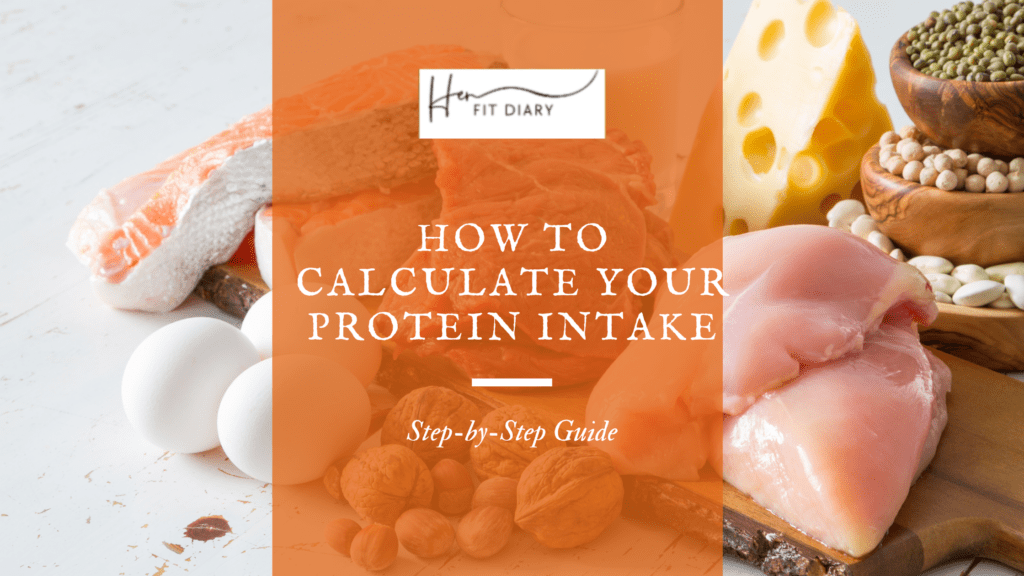
The basic formula to calculate your daily protein intake is to multiply your body weight in kilograms by your activity level.
For example, if you weigh 70 kg and engage in moderate exercise, you’ll need approximately 1.6 g of protein per kilogram of body weight to support muscle growth.
This means:
70 kg × 1.6 g = 112 g of protein daily.
Throughout this article, you’ll learn exactly how to calculate your specific protein needs, adjust for your weight and activity level, and track your intake accurately.
How much protein do I need a day?
Determining the right amount of protein depends on your body weight, activity level, and specific fitness goals.
Protein supports muscle repair, growth, and recovery, especially when paired with consistent resistance training. However, consuming too much protein can lead to excess calorie intake, strain on kidneys and digestive discomfort.
Hence you need the right amount of protein daily.
Steps to Calculate Your Current Protein Intake?
You can use this protein intake calculator to know your daily recommended protein.
Alternatively, you can easily learn how to calculate your protein intake to build your muscle.
1. Calculate Your Body Weight in Kilograms
If you have a scale, you can stand it and ask someone to read out the number accurately. Or you visit a pharmacy or hospital and request your weight in kilograms.
If you’re using pounds, divide by 2.2 to get kilograms
Example: 154 pounds ÷ 2.2 = 70 kg
2. Choose Your Activity Level
- Sedentary (minimal exercise): 1.2g per kg – Your muscles need less protein for repair when you’re not regularly exercising
- Moderately active (3-5 days/week): 1.6g per kg – Regular exercise increases protein needs for muscle recovery and maintenance
- Very active (6-7 days/week): 1.8g per kg – Frequent exercise requires more protein to support increased muscle breakdown and repair
- Athletes/muscle building: 2.0-2.2g per kg – Intense training creates higher protein demands for muscle growth and recovery
3. Multiply Your Weight by Activity Level
For example, you weigh 70kg and do moderate exercise (1.6g per kg)
Therefore: 70 kg × 1.6g = 112g of protein daily
Hence, 112g is your daily baseline protein target.
4. Divide Into 3-course Meals
Nutritionists often recommend splitting your daily protein into 3 main meals for better calorie control and consistency. Eating more frequently can make it harder to track calories and might lead to overconsumption.
Hence, you should only eat 3 times a day. To break this down into meals, you’d divide the total protein equally:
112g÷3=37.3g (approximately 37g per meal)
So, you should eat 37g of protein per meal to meet your daily target.
If you’re in a calorie deficit, learn more about creating a balanced meal plan that meets your protein needs in this calorie deficit meal plan guide.
Daily Protein Intake for Women
There is no fixed amount of daily protein intake for women.
Rather your daily recommended protein depends on your weight and activity level.
So for a 29-year-old woman weighing 70kg, let’s calculate:
Depending on your activity level, here’s your protein needs:
- Sedentary (minimal exercise): 70kg × 1.2g = 84g protein daily
- Moderately active (3-5 days/week): 70kg × 1.6g = 112g protein daily
- Very active (6-7 days/week): 70kg × 1.8g = 126g protein daily
- Strength training/muscle building: 70kg × 2.0g = 140g protein daily
Note: Although the daily protein intake for women is not static, you need to adjust your protein intake if you are:
- Pregnant: Add 25g extra protein to your daily total
- Breastfeeding: Add 20g extra protein daily
- Over 50: Add 0.2-0.4g per kg to maintain muscle mass
- Losing weight: Aim for 1.8-2.0g per kg to preserve muscle
Daily Protein Intake for Men
There is also no fixed amount of daily protein intake for men. Your daily recommended protein depends on your weight and activity level.
So for a 30-year-old man weighing 80kg, let’s calculate:
Depending on your activity level, here’s your protein needs:
- Sedentary (minimal exercise): 80kg × 1.2g = 96g protein daily
- Moderately active (3-5 days/week): 80kg × 1.6g = 128g protein daily
- Very active (6-7 days/week): 80kg × 1.8g = 144g protein daily
- Strength training/muscle building: 80kg × 2.0g = 160g protein daily
Note: Although the daily protein intake for men is not static, you need to adjust your protein intake if you are:
- Building muscle: Stay at higher range (2.0-2.2g per kg)
- Over 50: Add 0.2-0.4g per kg to prevent muscle loss
- In calorie deficit: Keep protein high at 1.8-2.0g per kg
- Intense training: Can increase up to 2.2g per kg
Best Source of Protein
The rule of thumb I use to hit my protein goals is simple: I always include meat, boiled eggs, or chicken in my meals. Most of the time, I air fry and store my fish, meats, or chicken in advance to make things easier. If I’m in the mood for eggs or other protein sources, I quickly whip them up without hassle.
My advice? Meal prep your proteins ahead of time so you don’t fall into the trap of skipping them or making excuses. Having your proteins ready makes it so much easier to stick to your goals and stay consistent.
Here’s a handy list of high-protein foods and the grams of protein they provide per serving:
Animal-Based Protein Sources
- Chicken breast (100g): ~31g protein
- Turkey breast (100g): ~29g protein
- Egg (1 large): ~6g protein
- Salmon (100g): ~25g protein
- Tuna (canned, 100g): ~25g protein
- Ground beef (lean, 100g): ~26g protein
- Shrimp (100g): ~24g protein
- Greek yogurt (plain, 170g or 6 oz): ~17g protein
- Cottage cheese (100g): ~11g protein
Plant-Based Protein Sources
- Tofu (100g): ~8g protein
- Tempeh (100g): ~19g protein
- Lentils (cooked, 1 cup): ~18g protein
- Chickpeas (cooked, 1 cup): ~15g protein
- Quinoa (cooked, 1 cup): ~8g protein
- Edamame (cooked, 100g): ~11g protein
- Peanuts (28g or 1 oz): ~7g protein
- Chia seeds (28g or 2 tbsp): ~5g protein

